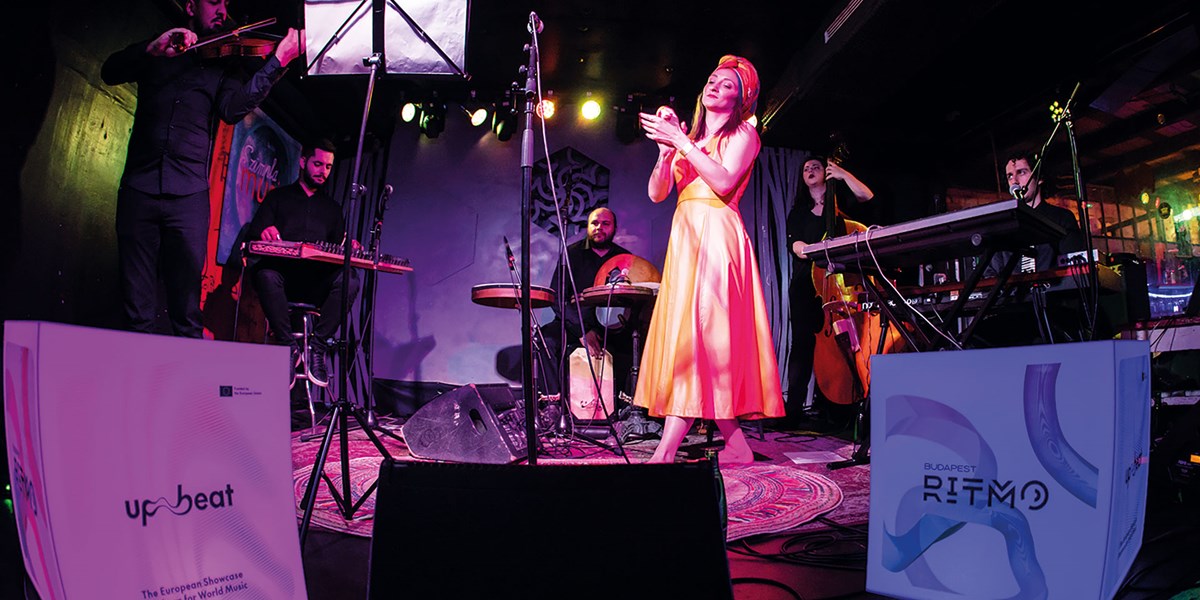Tuesday, October 7, 2025
UPBEAT: bringing European artists and festivals together
Simon Broughton speaks to Balázs Weyer of UPBEAT about their drive to bring European artists and festivals together [Advertorial]

Zarina Prvasevda (Márton Pesthy)
An ‘upbeat’ signals something is about to happen – the lifting of a conductor’s baton, an intake of breath, a silence before a storm. But something must follow. As an adjective, upbeat means positive and cheerful. And UPBEAT, a European platform bringing together world music artists and festivals, is delivering something positive as well. The third UPBEAT Best New Talent Award was given to accordion and violin duo Almir Meskovic and Daniel Lazar in April this year. Their prize was a Sofar Sounds concert in Budapest in May and a performance at the Czech Music Crossroads showcase festival in June.
UPBEAT is run by Hangvető, a music hub in Budapest, and co-financed by the EU’s Creative Europe Programme. It’s a network of showcase festivals across Europe dedicated to supporting new world music artists and raising their profile across Europe and beyond. The platform also supports networking and training to raise professional standards across the industry.
As the first three-year phase of UPBEAT comes to a close, 638 concerts featuring artists from 36 countries have taken place, along with workshops and mentoring sessions, and now a new four-year phase begins. Hungary is well-positioned – in the centre of Europe and closely connected to both East and West – to initiate this new initiative to promote music across Europe. Inevitably, most of the ‘world music’ is from Europe, although artists from all over the world can participate if they’re resident in the EU.

Cristina Clara (Joanna Correia)
“The creation of the world music label was a great emancipation process, liberating an army of many different musics and artists around the world,” says programming director Balázs Weyer. “By giving it a name, [world music], it gave birth to a new scene. But that was 35 years ago and the founding generation and the enthusiasm is fading out. At many events, audiences are ageing. A movement has a lasting impact if it can survive the first generation. We are at the point where we need to think about this. This was the main drive behind UPBEAT.”
There are different scenes in Western and Eastern Europe. In the West, there’s often been a post-colonial narrative to explore the cultures of places that have been colonised. In the case of Britain, that includes many parts of Africa, the Indian subcontinent and the Caribbean. In France, it’s West Africa as well as Southeast Asia and the Caribbean. The Netherlands has its own connection to Indonesia and the Caribbean. And, of course, there’s the diaspora of people from these places living in Europe.
In Eastern Europe, it’s a rather different narrative. There isn’t that colonial history, but there’s often a lively contemporary folk scene, sometimes fuelled by Roma communities, which sits alongside global music. This scene is a recent phenomenon, which means audiences are generally younger. As Hungary is strategically situated between West and East with good connections in both directions, Weyer sees UPBEAT as a way to break down stereotypes and get this music onto different stages.
“The ‘world music’ emancipation process was very powerful, but it also created a ghettoisation of the genre. If you wanted to listen to world music, you would go to a world music festival”, says Weyer. So, one of the aims is to get world music artists into a wider range of festivals and UPBEAT has launched new showcase programmes in places where they didn’t exist previously, including Bulgaria, Lithuania and Poland.
A key aim is to support emerging artists, and one way they achieve this is through the Best New Talent Award. So far, out of 500 nominees, 30 artists from all over Europe have been selected – including Estonia’s Duo Ruut, Italy’s Suonno D’Ajere, Poland’s Hajda Banda, Portugal’s Cristina Clara and France’s Oriane Lacaille. The winners have been Zarina Prvasevda from North Macedonia in 2023, French Congolese singer Fanie Fayar in 2024, and Norway-based Almir Meskovic and Daniel Lazar, from Bosnia and Serbia, respectively, who took the award this year.
At the end of its first phase, UPBEAT reached 20 members and 14 associated partners, including showcase festivals like WOMEX, Tallinn Music Week, Budapest Ritmo and MENT in Ljubljana, which didn’t previously include world music. Festivals only receive support if they can prove their impact. “They get the highest credit if they can show that artists got invitations in the 12 months following their showcase. This motivates showcases to track invitations and to invite delegates who can invite artists, not just ‘showcase tourists’”, says Weyer. After a showcase at MENT, Susobrino, born in Bolivia and now based in Belgium, got an impressive 10 confirmed gigs. “Susobrino is killing it right now”, says his manager, “we had a really good summer run.”
To really analyse the impact of UPBEAT, Patryk Galuszka, an independent researcher from the University of Łódź, was commissioned to conduct an open-access study on the impact of UPBEAT. After research and interviews lasting over a year, he concluded the platform has created a stronger professional network in Europe, broken down limiting preconceptions, helped in bridge building and furthered the careers of many artists, not just Susubrino. It may also be a result of UPBEAT that this year’s Budapest Ritmo – it’s 10th anniversary – was sold out for the first time and had an appreciatively younger audience. In addition to UPBEAT, Hangvető organises Budapest Ritmo and was responsible for the MOST Music (The Bridge for Balkan Music) project, also co-funded by Creative Europe.
UPBEAT had a stand at the last WOMEX in Manchester, and inevitably, there was much interest from UK artists. It should be noted that while applicants don’t have to be born in the EU, they must be resident in the EU. The UK isn’t part of the Creative Europe scheme. There will be an UPBEAT press conference in Tampere, Finland this year and UPBEAT-supported concerts on the OffWOMEX stage.
Ahead lies another four years of network building and discovering new talent, with the results showcased on stages across Europe. Reason enough to keep upbeat.

